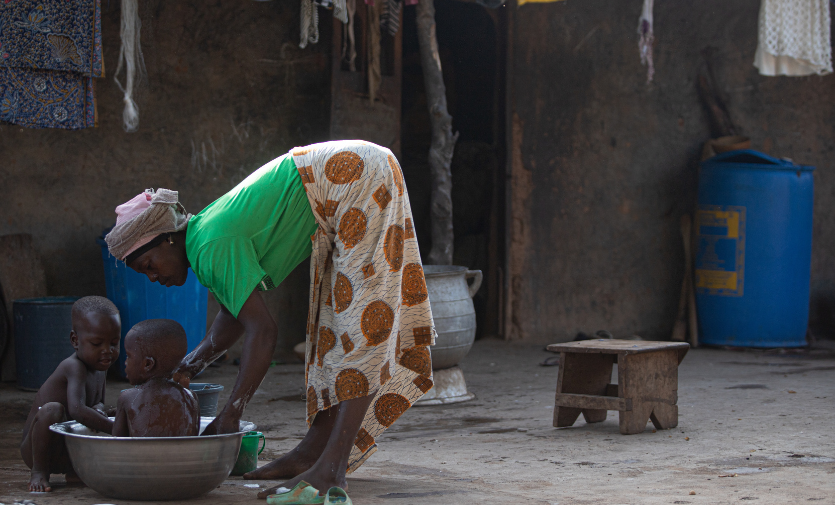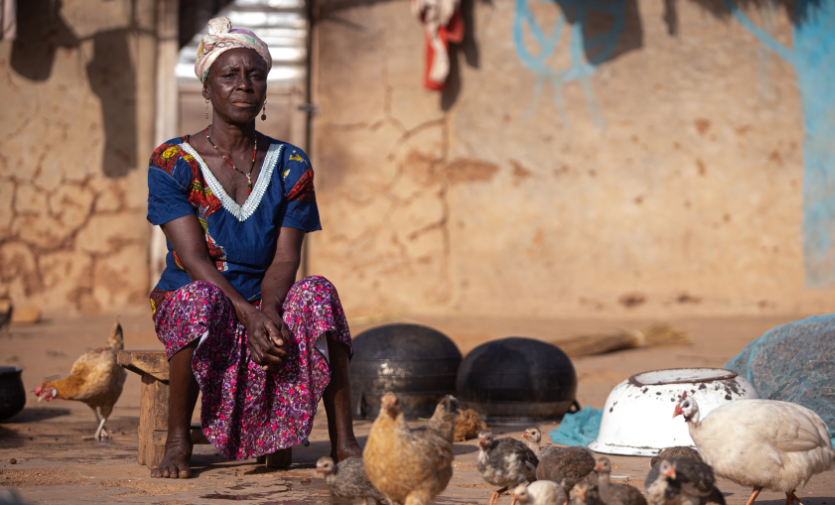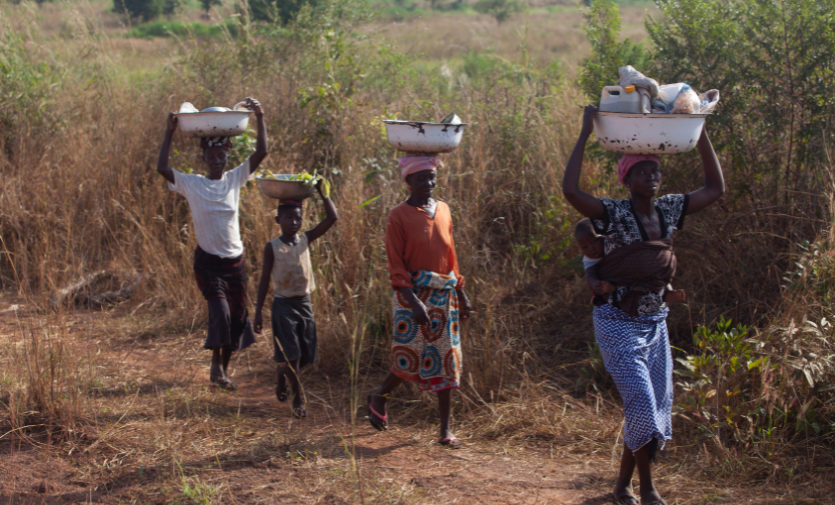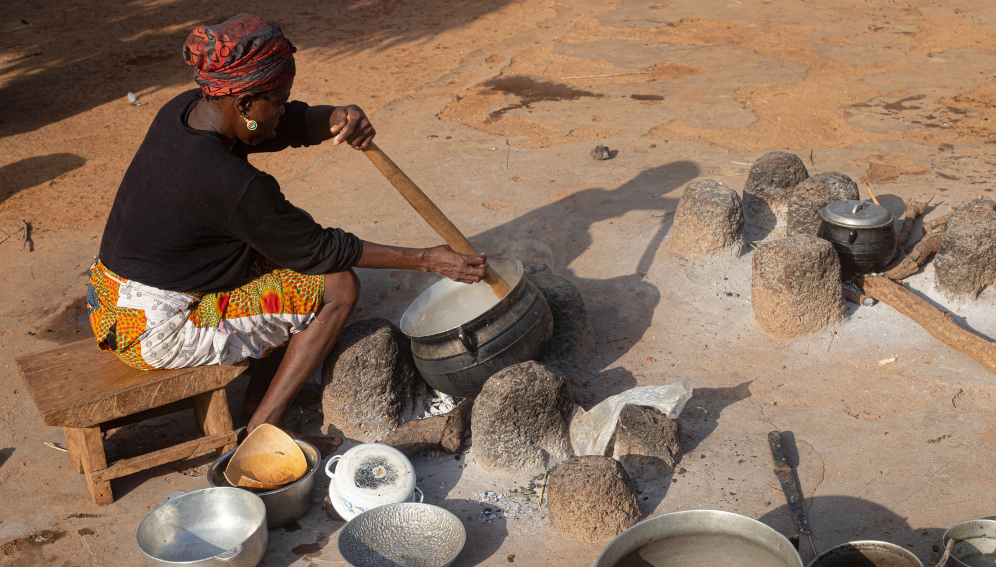By: Theodore Abiwu and Justice Baidoo
Send to a friend
The details you provide on this page will not be used to send unsolicited email, and will not be sold to a 3rd party. See privacy policy.
This article was supported by Lloyd’s Register Foundation
In a small farming community near Bouake, Ivory Coast, nine people, including children, died in a bout of food poisoning in September, 2023.
Fatoumata Isidore had gathered with neighbours one weekend to share in a traditional meal of corn porridge, prepared at her home in the village of Niangban.
Later that night she began to feel horribly unwell.
“Sunday, around four in the morning, it started,” she tells SciDev.Net.
“I left with four children; I came back with only one daughter.”
Fatoumata Isidore, villager, Niangban, Ivory Coast
“I could hear my children crying: ‘mum, my stomach hurts, mum, my stomach hurts.’
“So, we went outside to find a motorbike taxi to send them to the hospital.”
While at the hospital, three of Isidore’s children died.
“I left with four children; I came back with only one daughter,” she says.
“It hurts me, it hurts me a lot,” Isidore sobs painfully, while recounting her ordeal, flanked by her husband and other mourning villagers.
More than 70 villagers were infected from food suspected to have been tainted by pesticides, local media reported.
When Ivory Coast’s Ministry of Health looked into the issue, it concluded that this incident was a result of the inappropriate use of parasiticides by farmers who grew the corn used for the porridge, according to the local media report. SciDev.Net was unable to reach the Ministry of Health to verify this.
Pascal Baridomo, who works as an advocacy officer at Inades, a local civil society group which works for food safety and wellbeing of farmers, sees pesticides poisoning food as a big issue that requires more attention. He says the country’s food regulators need to do more to reassure consumers.
“There are multiple pesticides including those which have expired and which are banned and which often escape controls,” he says.
“We are sitting on a ticking time bomb, and we need to be extra careful.”
Poor food hygiene
According to the World Health Organization (WHO), food poisoning is responsible for around 420,000 deaths a year globally.
Children under the age of five account for 40 per cent of the foodborne disease burden, with the highest toll in low- and middle-income countries.
Toxins such as pesticides are one source. Poor food hygiene practises are another. This appears to have been the case in the village of Boni, northern Ghana, struck by suspected food poisoning in June, 2023.
It was meant to be an ordinary funeral and like all the ones they had attended during their life, Taamome Budaali, a mother of eight and Manyoro Kwaami, another of nine, hoped this would pass without incident.
This one was, however, to go down as a day never to be forgotten.

Taamome Budaali bathing her children in Boni, northern Ghana. Credit: Evans Ahorsu
As villagers gathered for the sombre event in the nearby community of Gnani, Budaali and Kwaami partook in the local custom of drinking ‘Pito,’ a locally brewed beer, along with the other funeral-goers. However, they were unaware that the drink they had consumed may have been contaminated.
Later that evening, upon returning home, Budaali began experiencing severe stomach pains. Concerned, her husband sought the assistance of a traditional remedy, hoping to alleviate her discomfort. But these herbal concoctions failed to provide relief.
Budaali’s agony intensified, leading to hours of distress, filled with cries of anguish. Recognising the severity of her condition, her family rushed her to the district hospital in Yendi, about 20 kilometres away, for urgent medical attention.
More than 20 others were also taken to hospital, according to the villagers. However, the hospital said it had no records of exactly what was wrong with the patients.
“I was fine until I got home and started experiencing stomach pain,” says Budaali. “I suspected the Pito I drank and the food I ate at the funeral.”
“When I went to the hospital … I was given an injection and a drip,” says Kwaami, who also believes it was an infection from the drink she had consumed.
“I think it was infected during its preparation,” she adds. “During cooking, some women do not wash their bowls with soap and when the food is cooked, they leave it open to flies.”
Silent killer
Largely underreported and rarely talked about, food poisoning may well be a silent killer that many are yet to pay attention to, especially in West Africa.
When Felix Kwashie Madilo, a food scientist at Ghana’s Ho Technical University, studied the subject with his colleagues earlier this year, they found that between 2013 and 2021, almost 2,000 Ghanaians suffered from various forms of food poisoning. Around 60 of the cases resulted from disease outbreaks in which 36 people died.
Madilo says the subject is woefully under-researched and the true numbers may be worse than their study suggests.



Manyoro Kwaami believes that many people have died in the past from food poisoning in her village. Credit: Justice Baidoo
Their work found what they described as curiously low awareness levels among people – including students of health training institutions they had interviewed – on the issue of food contamination.
Amoako Duah is a gastroenterologist at the University of Ghana Medical Center in Accra. As the head of the internal medicine department of one of the country’s largest referral centres, his work brings him close to some of the most serious cases of food infection and its attendant complications for patients.
“In Ghana, studies have shown that for six to ten per cent of all OPD [outpatient department] cases, the diagnosis is a result of food poisoning because those that go to hospital with diarrhoea, gastroenteritis, dysentery, typhoid … are largely a result of food poisoning.”
Madilo’s findings are backed up by the results of the The Lloyd’s Register Foundation World Risk Poll 2021, which looked into people’s perceptions and experiences around safety risks.
Conducted by the global analytics firm Gallup in 121 countries, through more than 125,000 interviews, the survey delved into people’s concerns about and encounters with harm from food and water, as well as a host of other risks.
Participants were asked if they or someone they knew had suffered significant harm from food or water in the past two years.
More than 20 per cent of people in several African countries said they had suffered serious harm from unsafe food or water, according to the poll.
They were also asked how worried they were about experiencing serious harm from food or water. In both cases, more than half of respondents in Sub-Saharan Africa said they were very worried or somewhat worried.
At the beginning of 2023, the WHO warned that Africa was seeing an exponential rise in cholera and diarrhoea cases amid a global surge. Cholera is an acute diarrhoeal infection which people can get by ingesting food or water contaminated with the bacterium Vibrio cholerae.
In Nigeria, Africa’s most populous country with over 200 million inhabitants, an estimated 200,000 people die each year as a result of food-related infections, according to the country’s regulator, the National Agency for Food and Drug Administration and Control (NAFDAC).
Here, as is the case in several of its West African neighbours, there are huge concerns over how fresh food is stored and sold, especially in markets.
Rotten food
On a sunny Monday morning, Ibhrahima Labaran and Fausat Amadu, traders in Ibadan’s Bodija market in Western Nigeria, are hard at work. The former sells watermelons and the latter sells tomatoes.
The market, one of the city’s largest, is heavily overpopulated, has barely any sanitation infrastructure, and its drains are choked.
This means food that comes through this place has a very slim chance of getting stored and sold in a healthy state.
Buyers, wanting to beat down prices, also prefer fruits and vegetables that are in their rotten state, according to some vendors here.
“Handling and sorting of the watermelon most times determines the [level of] degradation of the fruit quality,” says Labaran.
To make some extra money, Amadu says she has special customers for her rotten tomatoes.
“Restaurant owners buy them and people who can’t afford ripe tomatoes, too, buy them. We don’t pour it away at all,” she says.
“At the moment, market sales are dull but on a good market day, we sell two baskets of rotten tomatoes.”
Fausat says a basket of rotten tomatoes costs about 30,000 Naira (US$38) or US$32. “It depends on the market day sales and the quality of the rotten tomatoes,” she adds.
Such practices by market women to shore up food sales is rife in West Africa – so rife that many of them have now been normalised.
In Ghana, the Food and Drugs Authority conducts routine searches in markets to find culprits of these practices.
In May this year, the authority introduced a traceability system to try to identify individuals involved in illicit activities along the palm oil supply chain. The move came after a survey last year found that almost a quarter of palm oil had been stained with Sudan IV dye. The dye, which is potentially carcinogenic, is added to palm oil to increase its redness and attract more customers.
“We have systems in place to check the safety of food and we, as an authority, are working round the clock to push for punishments for these acts and ensure that food sellers sell only wholesome food,” says Kofi Essel, head of the authority’s food industrial support services department.
But he says people also need to take responsibility for their own food health.
Liberia, one of the smallest countries in Africa with barely 5 million inhabitants, is also one of the world’s poorest. Unlike Ghana and Nigeria, the country doesn’t yet have any strict legal regime to regulate food safety.
Peter Gbayor, from Grand Gedeh County in the southeast of the country, suffered food poisoning after returning from an event two years ago. Like Budaali and Kwaami, Gbayor didn’t realise he had eaten contaminated food until he got home and started experiencing severe side effects.
“When you eat poisonous food, sometimes you will see [that] your feet start getting swollen, your stomach starts getting big and you will start getting dry,” he says.
“You will start seeing yourself as an AIDS patient in the end. Some people will even start calling you an AIDS patient, if you are not careful. [All this] happened to me.”
“We need to reform regulatory laws to make them more effective and then we need governments to resource the regulators to effectively enforce them.”
Amoako Duah, gastroenterologist, University of Ghana Medical Center
It was the same with Jamal Waylee from Margibi County in northern Liberia. He and his younger brother bought a local delicacy, ‘bitter ball toborgee’, from a street vendor.
Everyone who ate that particular meal was affected but his case was particularly severe. He says he ate it close to midnight and by morning had already gone to the toilet seven times.
“People said that the woman was cooking the food and left it,” he tells SciDev.Net. “When she went to her house, somebody put something in the food … everybody who ate that food got affected.”
Awareness lacking
In the interviews conducted for this investigation, there were two common strands: a lack of awareness of what food poisoning is and what to do or where to go when a case is suspected.
Back in Boni, SciDev.Net spoke with Justice Joshua Dawumi, an environmental health practitioner who witnessed the poisoning incident that Budaali and Kwaami were involved in.



Taamome Budaali began experiencing serious stomach pains after partaking in the local custom of drinking ‘Pito,’ a locally brewed beer, along with other funeral-goers. Credit: Justice Baidoo
He told SciDev.Net that cases of food poisoning were not new in the area and that such incidences were “rampant”.
Having lived in the area all his life and worked in many communities around the municipality since his training, Dawumi says a lot of people tend to have food poisoning after eating something at events like funerals. Consequently, he says, people now reject food when they attend these gatherings, which is an affront to the communal living that is integral to these communities.
He says: “Food safety in general is a problem here, from its storage to preparation to distribution.
“People often come from afar to prepare food for these gatherings and during the preparation the food sometimes gets poisoned or spoilt.”
Inadequate information is a major cause of food contamination, especially at the consumption level, according to Duah from the University of Ghana Medical Center. People have limited knowledge about food poisoning in general, he believes.
Improper use of harmful chemicals like fertiliser has a major impact on the safety of food, he says.
“Fertilisers are chemicals and these chemicals, if they are not applied at the time they are supposed to be applied, may be concentrated in the food that you will eat,” he explains.
“These chemicals affect the body when there is too much in the food that you are eating.”
The findings from the World Risk Poll are reflected in scenarios like the ones described in Ghana, Liberia and Nigeria and underscore the pressing challenges faced by African nations in combating food and water contamination.
Cholera surge
The stark statistics also align with recent warnings from the WHO, which raised alarm about a significant surge in cholera and diarrhoea cases across Africa earlier this year.
The continent witnessed an exponential rise in these illnesses amid a global uptick, signalling a critical need for interventions to curb such outbreaks.



Women returning from the market in the village of Boni, northern Ghana. Credit: Justice Baidoo
Reported cases of food poisoning in Sub-Saharan Africa represent only a fraction of the actual occurrences, due to numerous socio-cultural and economic factors that impede accurate reporting and documentation.
The underreporting of food poisoning incidents underscores a complex interplay of societal, cultural, economic, and systemic challenges prevalent in African communities.
One of the primary reasons for underreporting is the limited accessibility and utilisation of healthcare facilities in certain regions or remote areas across the continent.
In many rural communities, inadequate healthcare infrastructure, coupled with long distances to healthcare centres, hinders individuals from seeking medical attention when affected by foodborne illnesses. This lack of access often leads to untreated cases that remain undocumented within official health records.
In Yendi and its surrounding communities like Gnani, adequate health facilities to cater to the health needs of the people are lacking.
Gnani, for instance, only has one centre for community-based health services that serves over 20 communities. Every referral from the location, therefore, has to go to Yendi, which is almost 30 miles away. People who are unable to travel to Yendi for treatment turn to traditional healing methods.
Based on the data from Ghana’s 2021 Population and Housing Census, conducted by the Ghana Statistical Service, Yendi municipality has a population of more than 154, 000 with over 74,000 of this number living in rural areas like Gnani.
The 2021 census does not provide data on the population of Gnani or its surrounding communities, but Dawumi believes that if all the 20 communities around Gnani are accounted for, “we should be talking about 20,000 and more”.
‘Spirits’ and stigma
Challenges with healthcare delivery in the Gnani community, and others in the country, compound food safety issues even further. And because the municipal hospital is so far away, people turn to herbal solutions for their ailments.
“In every community, we have individuals who proclaim to be our local doctors and everyone goes to them when they are not well,” Dawumi explains.
“Just imagine, without a motorcycle or tricycle, accessing the health facility in Yendi is always a problem. We are therefore forced to adopt the traditional ways of doing things.”
He adds that this is also a cheaper option for people, many of whom are not enrolled in the National Health Insurance Scheme.
Socio-cultural beliefs and practices also significantly influence reporting behaviours, according to Dawumi. He says traditional healing methods, deeply rooted cultural norms, and reliance on home remedies prevail in some communities.
Individuals may opt for these methods instead of seeking formal medical help, especially when faced with mild-to-moderate cases of food poisoning.



A pepper seller in Bodija market, Nigeria, arranges her produce for sale. Credit: Samuel Alabi
This then results in cases going unreported, contributing to the discrepancy between actual incidences and official records.
Dawumi adds: “No one desires to visit a traditional healer for medication, but with the absence of the health facilities here there is nothing [else] we can do.”
He and other contacts within the communities investigated for this story confess that people are secretive about food poisoning because they believe there are spiritual connotations to it.
Kwaami, Budaali’s friend with whom she attended the funeral in June, agreed with this belief.
When asked what factors she could ascribe to the causes of food poisoning that occurs in her community, she reluctantly responded: “Aside from leaving our food open, some people use spiritual things to poison the food we prepare for funerals.
“At a funeral, when someone uses a spiritual item like ‘goro’ to poison the drinks and is seen by someone, the drink is poured away.”



Pito is a type of beer made from fermented millet or sorghum in northern Ghana and other parts of West Africa. Credit: Justice Baidoo
Gbayor, from Liberia, paints a similar picture. He says: “Food poisoning is not something that is good and it’s also an African sign [bewitchment] and an African sign is not something to carry to the hospital for the doctor in the hospital to be able to diagnose. You can only deal with the country doctor [traditional healer].”
Additionally, the stigma associated with foodborne illnesses deters many Africans from disclosing their symptoms or seeking medical help. Fear of social ostracisation, discrimination, or negative perceptions from peers and communities may compel affected individuals or families to conceal their health issues rather than seek professional assistance.
This reluctance to disclose health problems perpetuates the underreporting of food poisoning cases and impedes accurate data collection.
Economic factors also play a pivotal role in underreporting. Financial constraints and the cost of healthcare services pose significant barriers to accessing medical care, particularly for marginalised communities.
In many instances, individuals might avoid seeking professional help due to concerns about the financial burden associated with hospital visits, diagnostic tests, and treatment. As a result, cases of food poisoning often go unreported, leaving a gap in official health records.
In Liberia, the absence of public health facilities raises the cost of healthcare exponentially.
Waylee in Liberia says people in his area have to pay for any medicines they need after diagnosis. “If you get a headache, you will buy the headache medicine from their pharmacy. So, if you don’t have money and you go there, you will die,” he says.
The lack of a robust surveillance system and inadequate reporting mechanisms within the healthcare system contribute to the underestimation of food poisoning cases. Insufficient resources, limited capacity, and challenges in data collection and analysis further compound the issue, resulting in an incomplete picture of the actual prevalence of foodborne illnesses in Africa.
Food poisoning in Ghana, as in many parts of Sub-Saharan Africa, stems from a cocktail of issues: low education levels among farmers and growers of food who are mis- or overusing agrochemicals; poor storage and sale facilities; mishandling of food by vendors and, in many instances, the inability of consumers to assess whether what they consume is safe.
“I think that many people have died in the past in this village as a result of food poisoning,” says Kwaami, adding: “We can’t say for certain they did, because even if you get it, the health centre to diagnose you is far and you won’t go, so you won’t know and just die.”
Kwaami’s fears capture that of many others who may be victims of food poisoning’s silent prowl.
“We need to educate the farmers who produce the food for us about the importance of making sure that the food is produced in a conducive environment,” says Duah.
“If they are going to apply fertilisers, they should know when to apply those fertilisers and then also the water they use to irrigate their crops, they should make sure [it] is coming from a clean source.
“We need to reform regulatory laws to make them more effective and then we need governments to resource the regulators to effectively enforce them.”
This article was produced by SciDev.Net’s Global desk.
Lloyd’s Register Foundation is an independent global safety charity that supports research, innovation, and education to make the world a safer place. Its mission is to use the best evidence and insight, such as the World Risk Poll, to help the global community focus on tackling the world’s most pressing safety and risk challenges.














